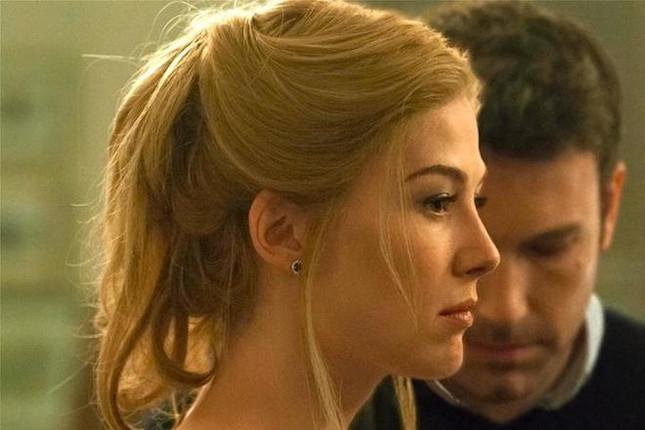From Gillian Flynn’s hit novel, David Fincher produces a sultry and electrifying thriller, leaving its viewers hooked.
Natalie Chaparro, Staff Reporter
Originally published December 12, 2014
Director David Fincher worked closely with author Gillian Flynn on his film “Gone Girl.” The fruition of Flynn’s writing and Fincher’s directing is a movie that proved itself in the box office, grossing $37,513,109 in its first weekend.
There are often worries when a best selling book gets made into a film. Will it be good? Will it have my favorite part? How are they going to make this movie?
Left in the hands of David Fincher, this lively thriller puts the the hit novel “Gone Girl’s” fanbase at ease with excellent accuracy from the written form. Not only does the movie illustrate the aspects from the book about gender roles and combative spouses, but it perfectly portrays that eerie twist that has left its viewers charmed and wanting more.
Nick (Ben Affleck) and Amy (Rosamund Pike) play two married former New York writers whose relationship has been put utterly into proportion. After moving to Nick’s hometown in Missouri, they begin to lose sight of their once fiery and witty bond. Amy, well praised and loved from afar, lives a fuzzy line of misconceived perfection. Her widely acclaimed novel, “Amazing Amy,” interprets a more impeccable version of herself throughout her childhood years and most of her early life.
Nick, on the other hand, mesmerized Amy with his laid-back and cocky image when they first met. That witty confidence soon turns into a standoffish and unsatisfied temperament when the spark in their marriage begins to fade.
As Amy narrates the past, Nick is stuck in the present, seen as the prime suspect of Amy’s sudden disappearance.
This stylish, prestructured and procedural thriller leaves the viewers disliking Nick more and more as the story progresses. Pity is felt for Amy, and the “cool, chill guy” persona Nick tries to maintain quickly becomes suspicious.
In the film, the media perceives the entire situation as strange and uncanny when a beautiful woman with such a famous childhood goes missing without a word. The only one that is there to be blamed is her handsome husband, living an equally well appointed life. The whole situation goes haywire and questions are still left unanswered as Nick continues to plead his innocence.
Halfway through Fincher’s film and through Flynn’s book, everything unexpectedly changes. It brings shock when a mystery like “Gone Girl” is so filled to the brim that you simply thought nothing else could possibly throw you off.
This is what is so captivating and rich about this strange missing person situation, seeming troubled from the very start.
When a novel with as many zigzags and coils as “Gone Girl” is turned into a film, picking the proper cast to do it justice becomes tricky. Every actor chosen to play the potent characters from the book must perfectly embody those personalities in the movie.
Neil Patrick Harris (playing Amy’s creepy ex-high school lover) and Carrie Coon (playing Nick’s hard-headed sister) are some examples of the marvelous and notable work accurately depicted from the book’s characters.
To tell this story, each character needs to be introduced with a sense of importance. It becomes easy to feel like you may have missed something because of how confusing Amy’s disappearance becomes.
However, Amy is a more complex character to introduce. Flynn intentionally portrays Amy as the character you are supposed to develop so many different opinions about. It makes for several different perspectives of what message this “battle of the sexes” concept is truly trying to impart to it’s audience.
From an angle, Amy is made out to be a laughably villainous character when, for example, a false rape conviction is brought to the table. From another angle, the film gives insight as to how competitive women can be with other women, and men with other men as well. It illustrates how there is always an urge to prove perfection to one another in our society, as seen in the “perfect” marriage that people thought Nick and Amy had, but was clearly not what it seemed. It was seen this way by the public because it was masked, causing the rancor in their marriage itself. Nevertheless, it is all how you choose to distinguish it.
What makes for so much room to take a position on this tale is the lack of elaboration on the real thoughts and emotions tossed around in their heads.
Love, hate and everything in between is open to interpretation when immersed in this dazzling story of a soon indifferent couple, projecting an alluring destruction on one another.
“Gone Girl” is captured with an unexpected genius that will have people on the edge of their seats. It is beautifully shot, and displays such a difficult concept admirably. It’s comical and makes you want to get in there and cause some mischief yourself. You will leave the theater with not only a new recommendation of entertainment for others, but a new perspective. I was almost marked by this story, left stumped by a powerful idea. It’s frigid, wicked, eye-opening and even more relentless, leaving you transfixed and hungry for what could happen next.

























